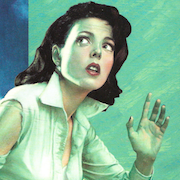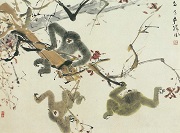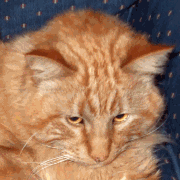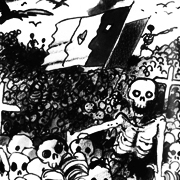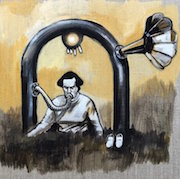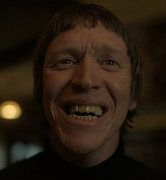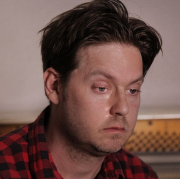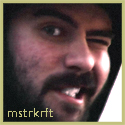|
Famethrowa posted:Though... considering how much YA mindset has become epidemic amongst that set I suppose I shouldn't complain so much. What does this even mean? I keep hearing this quality discussed among book-readers and I doubt I could recognize it unless someone pointed it out.
|
|
|
|

|
| # ? Jun 4, 2024 02:34 |
|
YA is short for Yes! Anime!
|
|
|
|
The Waterloo section is fun because Hugo prefaces it by saying he won't digress for very long and is just providing the reader some context and then goes off on it for like 100 pages.
|
|
|
|
Heath posted:I've been reading a lot of Japanese authors lately (mainly Mishima, Tanizaki, Oe, and some assorted excerpts from Donald Keene's Modern Japanese Literature, which I recommend as a good primer, in addition to a couple of nonfiction things) and basically everyone who sees me reading them goes to Murakami as That Japanese Author Everybody Knows who I should pick up next. But nobody seems to be able to give a specific reason as to why he's worth reading except that his books are popular and almost always get described as "dreamy" or "dreamlike," whatever that means. I'm curious about him because he clearly has some kind of cache with a general American audience that other Japanese authors don't seem to have broken through, but like was said above that appears to be accounted for simply by a combination of social media saturation and the fact that the stuff he writes holds the kind of quirky appeal that resonates with the sort of audience that would pose a dog-eared copy of WUBC next to a napkin with a semicircular coffee stain. From what you guys are describing it sounds more like the books are fantasy (in the non-genre sense) romps with manic pixie dream teens. And I guess jazz records are a constant theme too. I know this is several pages old but since the conversation got brought up this page, I guess I'll chime in. I genuinely really like Murakami's stories, and I've read almost everything he's written. I think there are a few things you have to get out of the way when talking about him: 1. His protagonists are horndogs and are often times not good people 2. He writes incredibly awkward sex scenes, and his narration always brings up women's bodies 3. More often than not, his books dip into the same well for inspiration, so they tend to be variations on similar themes rather than new reinventions every time (with some exceptions). That means jazz records, cats, folding laundry, unfulfilling sex, ear fixations, and all sorts of stuff come up over and over again That said, there are some things I really like about his stories. He writes about subjective encounters with the subconscious mind in a way that I find very compelling. Characters will have dreams, or enter hypnagogic states, and have mysterious encounters that seem inscrutable but very meaningful to them, because these encounters have something to communicate to them about death, or loss, or trauma. The supernatural is never just for fun in a Murakami story; it is always a monster in the etymological sense: a warning. The supernatural being is pointing to some truth about the protagonist, or about the protagonist's world, that they are either naive to or are actively repressing. But they're usually also morally ambiguous, and their warning is ambiguous but also crucial. They seem more metonymy than metaphor, so by the end of the story they still feel very "active" rather than "resolved", if that makes sense. Murakami allows his supernatural elements to remain unresolved rather than wrapping them up in a tidy metaphorical bow. I also think it's interesting that he places importance on the way people behave in their dreams. In "Thailand," a woman who is harboring some kind of grudge against a man who harmed her is told that she is going to dream about a snake, and she's instructed to behave a particular way to the snake in her dream. How she behaves is of utmost importance. In both Kafka on the Shore and Colorless Tsukuru, there are men who have dreams about committing sexual violence that they would never commit in real life. But the fact that a part of them was capable of doing it in their dreams weighs on them heavily, and they consider it a point of moral failure that tarnishes their character and spirit. I think this is a really interesting idea--that there's something beyond how you behave in society that matters. That there's an interior self, or a self that navigates imaginative spaces, and that its predispositions can't be separated from your conscious self. Sometimes our decisions are automatic, and happen without our conscious intervention, and these characters are shamed to know that they have failed a test of spiritual strength. His older stories tend to romanticize being a loner, with loose connections to people, but as he's gotten older his novels have placed a greater importance on connecting to people. Even his jaded, psychologically tumultuous loners have to find people to connect with. That's what Colorless Tsukuru is about, and I think Killing Commendatore is largely about people who have lost children in their lives and don't know what to do with themselves. So basically, I like his stories because they're about lonely, broken people trying to navigate their inner worlds and find connections in the real world. The pop culture symbols of Murakami are cats, jazz, whiskey, mysterious women, etc. but I think those are all false flags. His stories are about psychologically fractured characters trying to attain wholeness, and the attending chaotic eruptions of their inner landscapes onto their personal lives. His prose is usually leisurely and kind of repetitive, but it's also pretty smooth (When he gets an opportunity to describe something more dreamlike, I think the language elevates and becomes more striking). So even though his books have been getting pretty long, his leisurely writing style and familiar stomping grounds (jazz, cats, etc) give his books a strangely warm, comfort-read quality to them, considering how they're usually situated on top of a roaring chasm. I would recommend the short stories "A Shinagawa Monkey" (the 2006 one, not the sequel story, Confessions) and "Chance Traveler" as good representations of his overall works. I absolutely get why people would not like his stuff at all. But as a weirdo who has had intensely vivid dreams and nightmares almost every night for the entirety of my life, Murakami and Twin Peaks are kind of the only things I've encountered that have captured what that experience is like. (I'm also curious about the aforementioned "YA mindset")
|
|
|
|
Solitair posted:What does this even mean? I keep hearing this quality discussed among book-readers and I doubt I could recognize it unless someone pointed it out. An obsession with black and white morality tales that make them feel good, as opposed to grey and ethically ambiguous works. Go to any goodreads and pick a modern novel with a morally ambiguous or "bad" main character and look for the reviews complaining about the book making them feel bad or having a protag they "can't identify with". I can guarantee you'll see a ton of 5 star ya poo poo on their profile. Lolita is a fun one. I'll admit it's a broad generalization, but at least in the cursed world of online book discourse it really seems to describe a posting persona. E. It's almost a parasocial relationship with lit Famethrowa fucked around with this message at 21:21 on Oct 10, 2021 |
|
|
|
Famethrowa posted:E. It's almost a parasocial relationship with lit
|
|
|
|
FWIW that article about “banning the Odyssey” formed most if my opinion on the YA Mindset, but the mentioned school (and teacher) never banned it. Admins reworked the curriculum because of COVID, Homer got axed, other texts didn’t. I don’t know about this guy’s project, but he includes full quotations that look to be taken out of context, based on a blog post. https://mythoversal.substack.com/p/banning-homer
|
|
|
|
As sceptical as I am of the reports of classics being auto-da-fé'd by communist teachers, it should be noted that his guy's project is kind of comically unhistorical garbage, complete with framing Tiresias as neurodivergent and gender-fluid, which sounds like a satirical right-wing canard
|
|
|
|
lost in postation posted:As sceptical as I am of the reports of classics being auto-da-fé'd by communist teachers, it should be noted that his guy's project is kind of comically unhistorical garbage, complete with framing Tiresias as neurodivergent and gender-fluid, which sounds like a satirical right-wing canard His own opinions on the matter smell very YA, and his writing reeks of talking head monologuing, but the full quotes of the teachers involved make more sense to me than the outrage article originally put forth. Perhaps his project makes more sense as an example than anything else.
|
|
|
|
lost in postation posted:As sceptical as I am of the reports of classics being auto-da-fé'd by communist teachers, it should be noted that his guy's project is kind of comically unhistorical garbage, complete with framing Tiresias as neurodivergent and gender-fluid, which sounds like a satirical right-wing canard yeah I think it's really important to avoid the conservative canards when talking about this cultural moment, but I think there is something to say about how the (good + needed) project to promote alternative viewpoints to the majority white/European canon has, like all things, attracted a lot of people interested in selling their pet feel-good theories + bad fiction with a thin veneer of wokeness. basically this: Sham bam bamina! posted:It's also really preoccupied with Twitter drama in a way that's parasocial for the readers but cynical and self-promoting for the authors.
|
|
|
|
I saw some campaign related to that anti-Homer debacle about including books by POC and queer authors which was like 100% YA stuff, instead of people like baldwin, fanon, wole soyinka etc, and also completely ignored that some who wrote so-called classics were LGBT themselves this whole thing stinks from all ends really ulvir fucked around with this message at 22:22 on Oct 11, 2021 |
|
|
|
Cephas posted:I know this is several pages old but since the conversation got brought up this page, I guess I'll chime in. Thank you for this. It's good to read an informed opinion from someone who appreciates the work
|
|
|
|
I’m starting Faulkner’s Light in August. Bought years ago, but couldn’t make it click. His isn’t exactly the easiest prose out there.
|
|
|
|
derp posted:constantly impressed by how well people remember highschool I was at my sister’s wedding the other weekend and some woman was there I went to high school with. She started asking me about poo poo from high school and who I was in touch with and I just said “no one? I barely even remember anyone’s name” I didn’t even remember her name. I feel like maybe that’s related to how formative and important high school was to you ThePopeOfFun posted:I’m starting Faulkner’s Light in August. Bought years ago, but couldn’t make it click. His isn’t exactly the easiest prose out there. I’ve read several Faulkners and picked up an old (1940s printing) of this one at a book store a couple of months ago. Added to the pile, of course apophenium posted:Yeah poo poo there's that whole interpretation where each of the parts are dictated by some astrological sign and that various tarot cards factor in to character arcs, i.e Slothrop as the fool, Blicero as death. It's cool as hell. I’m reading Mason & Dixon atm and in that context this is plausible but Pynchon puts so much work into doing his astrology in full detail there i reckon you’d have to be an expert, as it were, to get much of such a reading
|
|
|
|
lost in postation posted:As sceptical as I am of the reports of classics being auto-da-fé'd by communist teachers, it should be noted that his guy's project is kind of comically unhistorical garbage, complete with framing Tiresias as neurodivergent and gender-fluid, which sounds like a satirical right-wing canard
|
|
|
|
TychoCelchuuu posted:"Tiresias is gender-fluid" is not the sort of thing that a right-wing satirist would invent as a left-wing take. It is (for insatnce) T.S. Eliot's take. T.S. Eliot, for those who don't know, was not exactly a leftist. I haven't read Eliot but what exactly is the "take". I know the myth
|
|
|
|
TychoCelchuuu posted:"Tiresias is gender-fluid" is not the sort of thing that a right-wing satirist would invent as a left-wing take. It is (for insatnce) T.S. Eliot's take. T.S. Eliot, for those who don't know, was not exactly a leftist. With the best will on the world, there's very little common territory between The Waste Land's pathetically hermaphroditic Tiresias ("Old man with wrinkled female breasts") as a poet-analogue who can empathise with both sexes and any modern notions of gender fluidity.
|
|
|
|
I'm sure stuff like that takes off more from horrendously outdated sexology like Krafft-Ebing and Havelock Ellis
|
|
|
|
lost in postation posted:As sceptical as I am of the reports of classics being auto-da-fé'd by communist teachers, it should be noted that his guy's project is kind of comically unhistorical garbage, complete with framing Tiresias as neurodivergent and gender-fluid, which sounds like a satirical right-wing canard O ya speaking of which read auto-da-fe by Elias canetti. It's about a guy who owns a lot of books and then marries his illiterate maid who proceeds to kick him out of the house.
|
|
|
|
I've started the new Knausgaard, The Morning Star, and it's good. Being unable to compare it to his other works (it's the first I've read by him) I keep thinking about it like it's a Scandinavian Stephen King novel, though much more deliberate and lacking the just slightly out of date cultural references. So far someone's accidentally stepped on a kitten. Someone else is bored of their marriage. And a new star has risen in the sky, inexplicable. Also it's exactly 666 pages. Very cute.
|
|
|
|
Got a couple audible credits need to use up if anyone here knows any good ones? The audiobook thread tends toward genre stuff
|
|
|
|
i did audiobooks for a long time and the version of Lolita read by jeremy irons is probably the best audiobook i've ever come across. he doesn't just read the book, he performs it.
|
|
|
|
apophenium posted:I've started the new Knausgaard, The Morning Star, and it's good. Being unable to compare it to his other works (it's the first I've read by him) I keep thinking about it like it's a Scandinavian Stephen King novel, though much more deliberate and lacking the just slightly out of date cultural references. Oh yeah I want to check this out. I just read and loved books 1 and 2 of My Struggle, those two by themselves had such a beautiful payoff.
|
|
|
|
Idaholy Roller posted:Got a couple audible credits need to use up if anyone here knows any good ones? The audiobook thread tends toward genre stuff I really like George Saunders's stuff, he reads it himself
|
|
|
|
thehoodie posted:I really like George Saunders's stuff, he reads it himself I was gonna say Lincoln In The Bardo, cuz you get a whole cast reading it. I like Michael C. Hall reading Breakfast at Tiffany's, but that one's free on Audible Plus.
|
|
|
|
congratulations to i assume between 1-3 posters in this thread https://twitter.com/clamatoes/status/1449450827874177025?s=21
|
|
|
|
elena ferrante is also almost certainly half man but i guess for reasons of propriety thats been suppressed in the discourse
|
|
|
|
Tree Goat posted:congratulations to i assume between 1-3 posters in this thread "no heaven without breasts" deserves the nobel, whatever it is
|
|
|
|
today I bought Posthumous memoirs of Bras Cubas and also The spectre of Alexander Wolf by Gaito Gazdanov
|
|
|
|
Posthumous memoirs of bras cubas is great
|
|
|
|

|
|
|
|
Is Hermanm Hesse good or just liked by pretentious people? I finished Narcissus and Goldmund and it turned out to be one of those books that would have completely rocked my world had I read it at a younger age, but as it stands is just good.
|
|
|
|
I liked Demian, but it's funny how clearly it falls into the 1910-1920s version of whatever emo-alternative is (theosophy, I guess). Siddhartha gets some kind of weird duplicity merit badge for confusing every western person who reads it into thinking they've learned about the Buddha's life. I've wanted to read the Glass Bead Game for a while now, but I haven't gotten around to it, and for a nobel prize winning novel, I've never once heard any one talk about it. All of this is to say that I could not tell you one way or another if Herman Hesse is actually any good, just that Demian has some pretty pithy new-age quotes that inspired my favorite anime (Revolutionary Girl Utena, the spiel about cracking the world's shell)
|
|
|
|
That's where that quote is from?
|
|
|
|
I guess I shouldn't say prescriptively that it's where the quote is from. “The bird fights its way out of the egg. The egg is the world. Who would be born must first destroy a world. The bird flies to God. That God's name is Abraxas.” I feel like the "God's name is Abraxas" part fits in with Utena's deal, where Dios is simultaneously Lucifer.It's not exactly the same quote, but it seems pretty close to me. I've always thought of it as the most likely inspiration. As far as I know there's no confirmation or anything on that, it's just my personal pet theory.
|
|
|
|
Cephas posted:Siddhartha gets some kind of weird duplicity merit badge for confusing every western person who reads it into thinking they've learned about the Buddha's life That's not really on Hesse, though, is it? Siddhartha is very explicitly not about Gautama, who appears as a secondary character.
|
|
|
|
Demian's good. Cephas is right in saying it reads like an early 1900's emo person learning how to meditate. I keep meaning to read Siddartha, Steppenwolf and Glass Bead Game, I've heard they're all better than Demian. I used to go to a book store, and one of the guys that worked there was this tall, bulky man with a big white beard and wild white hair, like a mix of Robert Altman and Alan Ginsberg, and he was a huge fan of the Glass Bead Game. Besides Hesse, he also introduced me to Lawrence Ferlinghetti and Been Down So Long It Looks Like Up To Me. He was cool.
|
|
|
|
lost in postation posted:That's not really on Hesse, though, is it? Siddhartha is very explicitly not about Gautama, who appears as a secondary character. It's not really Hesse's fault, no. But between it being about a character named Siddhartha and most publications of it having some depiction of Gautama Buddha on its cover, it seems like it confuses a lot of readers. I read it because I had a German professor who told me it was an easier novel to read for someone learning German, and that it was about Buddha's life. I remember thinking "huh, this doesn't sound exactly like what I remember about Buddha's story, but maybe there was more to it?" until I got to the point where Siddhartha meets Gautama. I thought the pivot point of the novel was pretty compelling, when Siddhartha respectfully declines studying under Gautama because he doesn't believe Gautama's teaching of a neat, tidy system like samsara having a supernatural, metaphysical exit point in enlightenment. I gave Siddhartha's idea a shot and was reading the novel while waiting in the lobby of a blood test clinic, surrounded by TVs blasting local news, people talking to each other, and babies crying, and I don't know if the oneness of reality really penetrated into my supreme consciousness. Not a bad book by any means, just an ironic one, because it's about a character who actively rejects Buddha's thesis but gets regularly mistaken for Buddha by readers. I feel like there's a Cervantes or Italo Calvino story in that somewhere.
|
|
|
|
Cephas posted:I read it because I had a German professor who told me it was an easier novel to read for someone learning German, and that it was about Buddha's life. Not gonna lie, that's kind of an appalling confusion for a German teacher to make about one of the most famous novels in the language.
|
|
|
|

|
| # ? Jun 4, 2024 02:34 |
|
One of my friends had that book when I was a teen and was always telling me to read it. But due to the way the title was formatted I thought for the longest time that the author's name was 'Siddhartha Hermann Hesse'
|
|
|






